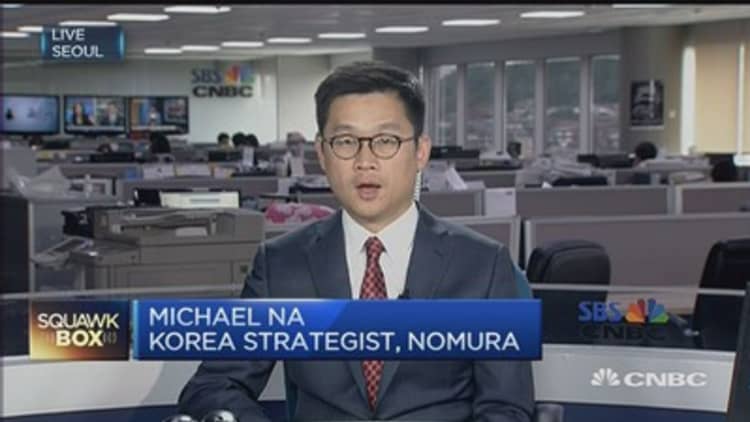The Bank of Korea (BoK) faces a delicate balancing act as it wards off damage from the MERS outbreak, with economists divided on whether more monetary stimulus will be needed to prop up South Korea's economy.
Worries that the growing number of Middle East Respiratory Syndrome (MERS) cases would hit growth prompted the central bank to cut its benchmark rate by 25 basis points to a record low of 1.5 percent at its policy review on Thursday, sending stocks modestly higher and pushing the Korean won lower against the greenback.
"We decided to cut rates today in a preemptive move to contain the economic fallout from MERS," BoK Governor Lee Ju-yeol said at a news conference.
Asia's fourth largest economy reported 14 new cases of MERS on Thursday, bringing the total number of infections to 122 - the highest rate outside Saudi Arabia. Nine people have died so far, and the majority of cases are confined to Seoul where patients have contracted the illness in hospitals.
Read MoreMERS: What you need to know
"Tepid consumer confidence might have taken another dent given the recent spread of the MERS virus, and so the rate cut serves as a pre-emptive move to cushion confidence," Mizuho Bank said in a note Thursday.
Indeed, the central bank warned that consumption appeared to have fallen following the outbreak, just a week after data showed May confidence hitting a seven-month peak.
A rate cut should also see the Korean won weaken further and that should provide some relief to exporters, noted James P. Rooney, chairman of Advanced Capital Partners. Exports, which make up almost half of the economy, dropped to a near six-year low in May, following the currency's 9 percent appreciation against the greenback during the past year.
"Even before the MERS case, we were expecting a rate cut to defend the currency," said Michael Na, Korea strategist at Nomura. Compared to Japan, South Korea's biggest export rival, the won has also strengthened 9 percent during the past twelve months.
A weaker currency could also help mitigate the tourism fallout, Rooney added. Tourism makes up a significant chunk of Korea's service sector, and it's expected to suffer the most as a result of the MERS scare.
The rapid spread of the illness has sparked public alarm in the country, with schools closed, public events called off, and thousands of visitors cancelling travel plans. Neighboring Asian countries have taken precautionary measures, such as screening travelers arriving from Seoul.

China is the only other Asian nation with a reported MERS case while Hong Kong authorities are currently testing two patients for infection after they recently traveled to South Korea.
"Korea has just become a major tourist destination for Asia, and that's helpful to its economy but MERS is clearly is a setback because now people are nervous about travelling, even local tourism has fallen off dramatically," said Rooney.
MERS is caused by a coronavirus that likely originated in animals, having been detected in camels in several countries, according to the Center for Disease Control and Prevention (CDC). The first reports of humans having contracted the MERS-CoV virus emerged in 2012 in Saudi Arabia.
Overall, analysts are confident South Korea can contain the outbreak.
"Most Asian countries have maintained controls since the 2003 SARS outbreak so while we do need to monitor this closely, the risks are short-term," David Gaud, Asia ex-Japan equity fund manager at Edmond de Rothschild, told CNBC. "We definitely won't be talking about this in September."
Further cuts ahead?
It's unclear, though, whether additional monetary stimulus is likely in the months ahead as policymakers attempt a delicate balancing act between expanding household debt and bolstering growth.
"We think it will take a severe deterioration in the growth outlook to convince the central bank to cut rates further given that it is still worried that the acceleration in household debt growth could pose a threat to financial stability," said Krystal Tan, Capital Economics' Asia economist.
Lower interest rates makes it easier for consumers to borrow money, and that tends to ramp up debt levels. South Korea faces one of the worst household debt levels among developed nations, with the debt-to-income ratio at 160 percent at the end of 2014.
But disinflationary pressures and the evolving MERS scare also allows the BoK to ease further if necessary, Mizuho Bank pointed out. Consumer price inflation ticked up 0.5 percent on year in May, well below the central bank's 2.5 to 3.5 percent target range.
Nomura's Na agreed: "We need more aggressive policy measures from BoK, otherwise we will likely see exports continuing to fall. Even without MERS, we were expecting 2.5 percent growth this year, lower than the government's 3.1 percent target. I wouldn't be surprised if the BOK delivers another rate cut."


